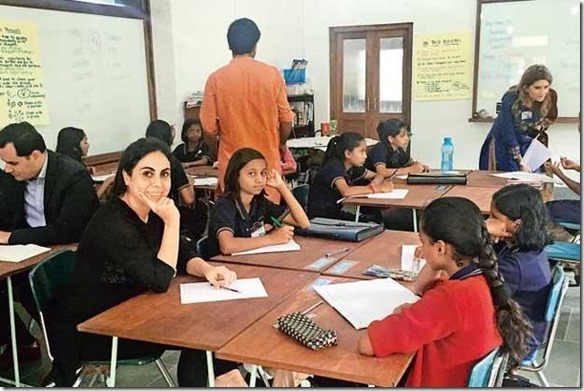Why you don’t need to wait till you’re a grandparent, to start passing it forward
Disclaimer: I’m not a philanthropist. Not by the conventional definition anyway—that to fit (and foot) the bill, you have to be wrinkled, wear glasses and play bridge.
Article by Nisaba Godrej | Live Mint
Why then am I writing this? For that very reason. To share with you why you don’t need to wait till you’re a grandparent, to start passing it forward.
Godrej at the Avasara Academy.
I (and many of you reading this) are among the lucky ones. We won the “ovarian lottery”—lucky by birth and opportunity.
Take a look at the odds. I was born in 1978. Let’s say I was one of 100 girls in India. By age 10, 35 dropped out of school. By 13, it was up to 50. When I turned 16, only 26 of us were left. By 18, it was down to 9. I don’t even have the number for graduate school. So, my glass in comparison to most others is very full.
The third US president, Thomas Jefferson, said, “To who much is given, much is expected.” The question I ask myself is, “If I have been so lucky, to receive the kind of education and opportunity which I have, then how am I going to pass it forward?”
Like a good MBA graduate, I have cascaded my answer into three sub-parts—a) What is my purpose? What am I passionate about? b) Who are the people I need to learn from? c) What platform do I have to leverage?
Passion and purpose
I am deeply passionate about education, especially for women. I truly believe that education is what transforms us and gives us the tools to realize our full potential.
My friend Aditya Natraj tells his Gandhi Fellows (Gandhifellowship.org) that they have to “1-8-5-4-3”—ask themselves: How do I affect 1 million people, across 8 sectors, with 5 discontinuities (what I am learning that is new) by 35, have 4 mentors and 3 failures every year?
I like his suggestion to focus on exactly what you want to commit to. So my commitment is: “to change the educational outcomes for a million Indian girls.”
People
I try to become friends with people who inspire me. When I hang out with Roopa Purushothaman, who founded Avasara Academy (Avasara.in), a residential leadership school for girls, I feel I need to be doing so much more and doing it much more quickly! Shaheen Mistri, who started Teach For India (Teachforindia.org) to realize her vision that in 50 years, every Indian child will have a good education; Ashish Dhawan, who quit his successful career at 43 to build the Central Square Foundation (Centralsquarefoundation.org) and Asoka University (Ashoka.edu.in); Deval Sanghavi and Neera Nundy, born in the US, who created Dasra (Dasra.org), a strategic philanthropy foundation for large-scale social change; and Anu Aga and Meher Pudumjee, philanthropists who give with such generosity and authenticity (Thermax Foundation), are people I’ve had the privilege of learning from.
Platform
I was brought up with two core ideas at Godrej. First, that 25% of our holding company is in a trust that invests in the environment, health and education. Second, my father emphasized the trusteeship of wealth, which means that I don’t actually own anything. My job is simply to make Godrej stronger and better during my years serving it.
I’ve had the opportunity to both drive value creation in our businesses and help create our Good & Green strategy (Godrejgoodandgreen.com), to build a more inclusive and greener India. For me, it is most important that besides our strong financial performance and innovative, much loved products, we are a good company.
If you’re looking for a platform, try Dasra.org, which strategically connects those who want to make an impact in areas they are passionate about.
Be the change
Someone once told Shaheen her goal was too audacious. Her reply holds true for anyone questioning what it takes to create change: “When Gandhiji had a vision of a free India, he didn’t follow a step-by-step business plan. When Martin Luther King believed in a world with no discrimination, he didn’t stop his work because of the worry of financial sustainability. I would argue that if they didn’t combine great management with a huge, huge sense of possibility—with a gigantic leap of faith— with the belief that together with their people, they would get there, they may never have.”
So, stop complaining about India’s woes. You can make a change. You can be the change.
I wish you the very best. Use your ovarian lottery wisely.
Nisaba Godrej is executive director of the Godrej Group.


